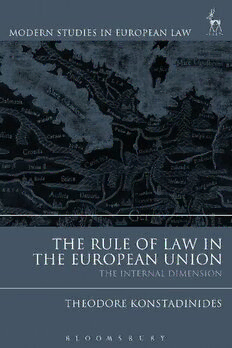
The Rule of Law in the European Union: The Internal Dimension PDF
197 Pages·2017·11.372 MB·English
Most books are stored in the elastic cloud where traffic is expensive. For this reason, we have a limit on daily download.
Preview The Rule of Law in the European Union: The Internal Dimension
Description:
This is a book about the internal dimension of the rule of law in the European Union (EU). The EU is a community based on law which adheres to and promotes a set of common values between the Member States. The preservation of these values (such as legality, legal certainty, prohibition of arbitrariness, respect for fundamental rights) is pivotal to the success of European integration and the well-being of the individuals within it. Yet, the EU rule of law suffers from an imposter syndrome and has been the subject of criticism: ie that it is only part of the EU agenda in order to legitimise sweeping new powers and policies, and that it plays little or no role in promoting a culture of compliance for either deviant EU Institutions or for Member States.This book will examine whether the EU rule of law deserves those criticisms. It will offer an analytical guide to the EU rule of law by conceptualising it and locating it within the sources of EU law. It will then ask whether the EU is based on the rule of law—a question which is answered in the affirmative, but one which has to be considered in the context of compliance and the overall effectiveness of the EU enforcement acquis. It is argued that, while the EU means well in its aim to preserve unity in an increasingly diversified Europe, the extent to which it can pave the way to a better world (based on a transnational rule of law concept akin to good governance and improvement of citizens’ lives) is dependent on the commitment of all European integration stakeholders to the EU project.Volume 78 in the Series Modern Studies in European Law
See more
The list of books you might like
Most books are stored in the elastic cloud where traffic is expensive. For this reason, we have a limit on daily download.
